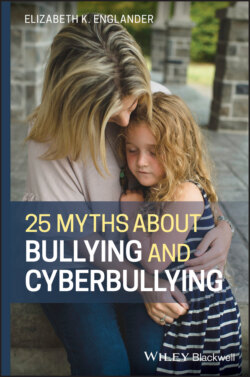Читать книгу 25 Myths about Bullying and Cyberbullying - Elizabeth K. Englander - Страница 6
Preface
ОглавлениеHave you ever heard of the Momo Challenge?
If you're lucky enough to have missed it, the Momo Challenge was a widely hyped Internet panic. The idea was that an intensely scary character could, unprovoked, pop up on the screen while any child was using any website and urge that user to hurt themselves. The chatter was frightening, but once you stepped back, the assumptions were a little bizarre: sure, maybe the scary character could pop up on any website; but could it really be true that even a healthy, well‐adjusted child could take the “challenge” and end up committing suicide?
Despite some media reports that purported to demonstrate the allegedly incredible power of this challenge through real‐life examples, it was never verified. A few cases that initially depicted Momo Challenge suicides seemed to have other, more plausible explanations; and in any case, they were far from widespread. Many reports came from social media instead of mainstream news media. The Momo Challenge may have been a hoax, or it may have been true but far less scary or widespread than it was depicted as being. But the damage that Internet scares can do was already done. The Momo Challenge – true or false – became yet another incident in modern life seemingly designed to scare parents out of their wits.
For all our modern conveniences, it's not an easy time to be a parent. We have age‐old problems on a new scale, like bullying. We also have entirely new problems for which we have no history to use as a guide, like cyberbullying (and Internet scares). Parents today aren't indifferent or uncaring; yet when it comes to our efforts to reduce bullying and cyberbullying, it sometimes feels like a case of two steps forward, one step back. We've made some progress in reducing bullying and cyberbullying, but in doing so we've also created other problems. At times, you may feel like you're so focused on protecting your children that they're not able to have a “normal” childhood. Technological innovations have also introduced new complications into the mix – most notably, digital communications and the use of social media. Children today grow up very differently from past generations.
But while these are challenging times, human beings have a pretty good track record when it comes to addressing stubborn problems. Consider: in the last few decades, we've successfully reduced teenage pregnancy, violent crime, illiteracy, school drop‐outs, and many other trials in the developed world. Like these, aggression and bullying are stubborn problems; but don't mistake this statement for fatalism. We can improve these troubles as well. The fact is, we've already made some solid progress. Many of us now recognize how serious a problem bullying and cyberbullying can be.
So, why did I write this book? Some of the ways we've addressed bullying and cyberbullying can actually hamper us if we're not careful. While our focus on bullying and cyberbullying has undoubtedly helped children become healthier and less aggressive, that focus has also resulted in a lot of noise, misinformation, myths, and anxiety for parents and children. This book addresses that noise and misinformation. These myths are not only ineffective; they can actively impede our efforts to reduce bullying and cyberbullying. This book is designed to help parents reject myths and become more effective in helping to guide our kids through modern childhood and adolescence.
As with my other books, it took a village to produce this one. I have a great deal of help and support, from my editors at Wiley to my staff at the Massachusetts Aggression Reduction Center and at Bridgewater State University. Special thanks to Jayne Fargnoli and Melissa Duphily for your support. But the real wind beneath my wings comes from my children – Josh, Nick, and Max – and my steadfastly wonderful husband, Michael, who believes in me and never has a moment's doubt. Love to all of you.
Elizabeth K. Englander
Boston, Massachusetts
2020
